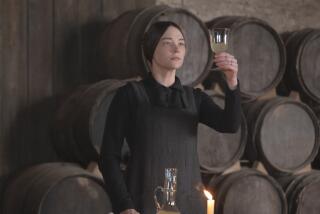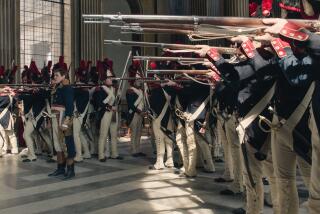MOVIE REVIEWS : A Sentimental Journey in âMy Motherâs Castleâ
In âMy Motherâs Castleâ (Laemmleâs Royal), Yvesâ Robertâs second film from French playwright and cineaste Marcel Pagnolâs autobiographical quartet, the mountains of Provence look like a photo album paradise. Glistening with sunlight under crystalline skies, theyâre the mountains of childhood, comfortable as an old coverlet.
Itâs an old manâs view of early youth, and a double-filtered one. Pagnol was in his 60s when he wrote âCastle,â which mostly covers a rhapsodic year spent by himself, his close relations and friends in Marseilles and the neighboring Provence countryside.
Director Yves Robert is 70. And perhaps inevitably--because the aging often cherish childhoodâs memories above all--itâs sweet, glamorized, idealized. Like the previous Pagnol-Robert memory-film, âMy Fatherâs Glory,â âCastleâ is beautifully shot and designed, supremely tasteful, often well-acted--and sometimes a bit lifeless.
Robert catches the bookâs reverie, its wistful tenderness. But he misses much of Pagnolâs earthy wisdom, irony and spontaneity.
Thereâs another problem. Robertâs film of âMy Fatherâs Gloryâ gobbled up the text of that first book and about a third of âMy Motherâs Castleâ as well--leaving almost nothing substantial for this movie but one long climactic episode: the Pagnol familyâs adventurous trespassing of wealthy estates along the canal paths with an illicit key. So another episode has been added: a perverse love story with a spoiled little girl (Julie Timmerman, radiant and tart). This off-key interpolation suggests whatâs flawed in Robertâs approach: preciousness, calculation.
Robert himself is known for urbane, tense sex comedies, like âPardon Mon Affaire,â and his staging is precise, crisp. Heâs also well aware that heâs directing a French classic, and it shows in his treatment--which is carefully boisterous, tastefully joyous. All too often, Robertâs actors, seem trapped inside his immaculately balanced, exquisitely lit compositions. Toward the end, Jean Carmet as the surly, sodden old estate guard performs with the unguarded zest of the best of Pagnolâs â30s actors. But the movie doesnât often match this brio. Instead, it remains polished, careful, pretty.
Thatâs not necessarily bad. A good, well-mounted literary adaptation, even one that misses something essential in it subject, can have lots of side benefits. Here, we get little joys throughout: the countryside; compositions that wittily suggest Seurat or bits of Boudin in motion; nice touches of sensitivity from Philippe Caubere as father Joseph, from Didier Pain as Uncle Jules, and from Philippe Uchan, as canal spiker Bouzigue, who has the loopy good humor of a French Randy Quaid.
Seeing âMy Motherâs Castleâ (rated PG) and âMy Fatherâs Gloryâ without knowing Pagnolâs books or movies, one might write off Pagnol as a nice, but sentimental writer, lucky to get such a lush production. But knowing Pagnol and what the movies could have had, shouldnât diminish the smaller but sunny pleasures they do summon up.
âMy Motherâs Castleâ
Philippe Caubere: Joseph Pagnol
Nathalie Roussel: Augustine Pagnol
Didier Pain: Oncle Jules
Therese Liotard: Tante Rose
An Orion Classics release. Director Yves Robert. Producer Alain Poire. Screenplay Lucette Andrei. Cinematographer Robert Alazraki. Editor Pierre Gillette. Costumes Agnes Negre. Music Vladimir Cosma. Production design Jacques Dugied. Running time: 1 hour, 38 minutes.
MPAA-rated PG.
More to Read
Only good movies
Get the Indie Focus newsletter, Mark Olsen's weekly guide to the world of cinema.
You may occasionally receive promotional content from the Los Angeles Times.










